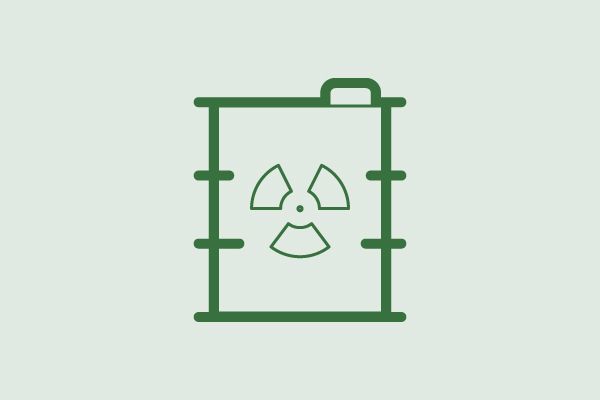General information on radioactive waste

Radioactive waste means radioactive materials, which cannot be further used. They are subject to control by official authorities.
Radioactive waste arises in the course of many useful applications of radioactive substances in the fields of medicine, industry and research. Moreover, radioactive wastes also arise in the course of the dismantling (decommissioning) of nuclear plants, which are not needed any more. They must be treated appropriately and disposed of safely.
In Austria, there arises only low and medium-level radioactive waste. According to the provisions of the Bundesverfassungsgesetz für ein atomfreies Österreich (RIS) (Federal Constitutional Act for a Nonnuclear Austria) no nuclear power stations are operated in Austria. For this reason, neither highly radioactive wastes nor spent fuels have to be disposed of. Austria’s one and only research reactor is operated at the TRIGA Center Atominstitut (Institute of Atomic and Subatomic Physics) of the Vienna University of Technology. The fuels of the research reactor are sent back to the supplier, the US Department of Energy, after having been used. The bases of it are legal obligations and a take-back agreement.
In this way, the situation in Austria differs, regarding the disposal of nuclear waste, from that in other countries with nuclear power stations. On the one hand, the quantity of waste to be disposed of is considerably lower in Austria and, on the other hand, the technical and financial requirements regarding the permanent disposal of Austrian waste are considerably lower.
Background
Radioactive waste is subdivided into weak- intermediate- and high-level waste as well as into short- and long-lived wastes. The public discussion is marked by the permanent disposal of high-level radioactive fission products from the utilisation of nuclear energy, as the fuel rods are radiating strongly and are, with a temperature of 300 degrees Celsius, difficult to be stored.
Principles for the disposal of radioactive waste
Basic radiation protection principles
For the responsible way of dealing with radioactive waste generated in Austria principles defined at international level are applicable.
- One basic principle is avoidance and minimisation. This is to be aimed at for ecological reasons, due to considerations of safety-relevance and, last but not least, for economic reasons.
- Humans and the environment must be protected sustainably from radioactive waste.
- The safety measures have to be defied, depending on the degree of risk.
- In all steps of the disposal of radioactive waste a facts-based and documented decision-making process is applied.
- The costs of the disposal of radioactive waste are covered according to the polluter-pays-principle. Enterprises and organisations generating radioactive waste must bear the costs of the processing, the intermediate storage and later, of the permanent storage.
What do these principles mean in concrete terms?
- It is laid down in radiation protection law that activities with radioactive substances have to be justified and optimised. This means that the use of radioactive substances is in principle only approved by the authority if there is no alternative, more practicable option available and if the benefits outweigh the costs.
- Low- and intermediate-level radioactive substances bear, in principle, a lower risk than high-level radioactive substances and spent fuels; this is why the final storage of the first requires less complex safety measures. This has to be taken in consideration accordingly when defining safety measures for a potential final repository.
- Every polluter being responsible for radioactive waste has to pay, when handing over the waste to Nuclear Engineering Seibersdorf, a respective treatment and prevention fee (for the conditioning and the intermediate storage of waste and for the final storage later on). The fee depends on the volume of waste - the less waste is generated - the lower are also the costs generated for the polluter.
Principles especially for Austria
- The Nuclear Engineering Seibersdorf GmbH (NES) is commissioned by the Republic of Austria with the treatment of radioactive waste generated in Austria.
- Operators of research reactors have to make sure that no spent fuel is generated in Austria for final storage.
- In the course of waste treatment or disposal the options of European and international cooperations have to be taken into consideration.
- Until a decision on the final storage is taken, the radioactive waste is subject to intermediate storage at NES. This is laid down by a contract until the year 2045.
- The Republic of Austria bears the ultimate responsibility for the safe disposal of the nuclear waste generated.
The Federal Ministry of Agriculture, Forestry, Climate and Environmental Protection, Regions and Water Management (BMLUK) as supervisory authority
The disposal of radioactive waste takes place in Austria exclusively via the NES. This disposal plant was commissioned by the Federal Ministry of Climate Action, Environment, Energy, Mobility, Innovation and Technology (BMK), in the meantime The Federal Ministry of Agriculture, Forestry, Climate and Environmental Protection, Regions and Water Management (BMLUK). In the course of the disposal of radioactive waste, the basic principles of a safe disposal must be complied with. This includes the principle of minimisation or the polluter-pays-principle. The supervision falls within the competence of the Federal Ministry of Agriculture, Forestry, Climate and Environmental Protection, Regions and Water Management (BMLUK) and regular inspections of all plants and facilities of NES are carried out by it.
Note
The Austria strategy for a responsible and safe disposal of radioactive waste is laid down in the Nationales Entsorgungsprogramm (National Waste Management Programme) (in German only). For the implementation of the programme, the federal government has established the Entsorgungsbeirat (Austrian Board for Radioactive Waste Management).